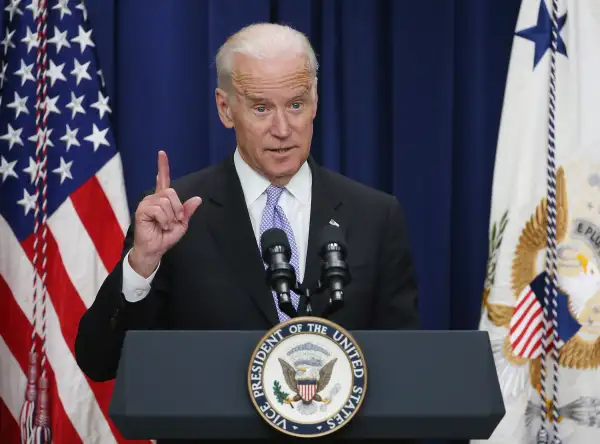Notable Cases of Plagiarism (Other Than Melania Trump's)
- How Mitch McConnell Helped Raise $300,000 for Planned Parenthood
- Here's How Much Money Obama and Biden Will Get From Their Pensions
- How to Support the Women's March on Washington Even If You Can't Go
- These Are the 25 Highest-Paying Side Hustles
- Meet Goop’s Shaman, a Crystal Expert That Helps People With Their Careers

If you thought Melania Trump's speech at the 2016 Republican National Convention Monday night sounded a bit familiar, it's probably because you heard Michelle Obama say some of the exact same statements back in 2008.
Reporters on Twitter quickly discovered that an entire paragraph of Trump's speech was the same, almost verbatim, to Obama's first Democratic National Convention speech. The Trump campaign has denied that the speech was plagiarized, while RNC Chairman Reince Priebus said he'd fire the speechwriter who copied Obama's speech. (Others have made less...coherent arguments.)
Read Next: Don't Get Accused of Plagiarism Like Melania Trump
While it seems extraordinary that a high-profile campaign like Trump's would not have vetted Melania's speech, Kelly McBride, a media ethicist on the faculty of the Poynter Institute, says there is no doubt Trump repeated Obama's speech without attribution.
"Politicians have ghost writers and speech writers all the time, that’s not an unacceptable practice, but if your name is going on the words, you have the ultimate responsibility for how they’re crafted," says McBride.
Here are some other notable examples of plagiarism over the years.
Joe Biden
Back in 1987, now Vice President Joe Biden's then-presidential campaign was derailed when a case of plagiarism from his law school days was rediscovered amid allegations that he was "using material from others' speeches without attribution."
According to the New York Times, Biden's college record, which he released to the public, stated that he had "used five pages from a published law review article without quotation or attribution" in an article he wrote for the Fordham Law Review.
Biden was also accused of plagiarizing a speech made by Neil Kinnock, the then-leader of the U.K. Labor Party. Biden dropped out of the race as a result.
Jayson Blair
Jayson Blair was a reporter for the New York Times who enjoyed a quick career ascendency, landing a full time job at the country's most prestigious paper after a few internships, according to the Society for Professional Journalists. Blair was soon assigned to the national news desk and covered high profile events, like the war in Iraq, where questions about the authenticity of his work soon surfaced.
After an investigation by the Times, it was revealed that Blair had fabricated sources, quotes, events, and more for a series of articles on military families, as well as lied about where his "reporting" took place. His case is one of the most notorious examples of plagiarism in the modern journalistic era.
"The widespread fabrication and plagiarism represent a profound betrayal of trust and a low point in the 152-year history of the newspaper," reads the Times' report of the incident. At the time the report was written, the Times had found problems in half of the articles Blair had written for the paper.
Katie Couric
In 2007, Katie Couric was in the middle of a plagiarism scandal at CBS News, when a web producer who was hired to write blog posts for Couric copied a column written by Jeffrey Zaslow for the Wall Street Journal.
While Couric herself didn't crib Zaslow's writing, the case raised questions about why Couric couldn't write her own personal columns, and how authentic her blog posts were after all. Bob Steele, the director of ethics in journalism at the Poynter Institute at the time, said fault for the plagiarism lied with both Couric and the producer.
"The journalist whose name is on it is still responsible," Steele told ABC.
Alex Haley
While Alex Haley's Pulitzer Prize-winning book Roots remains one of the most enduring works in African American literature, the author would later admit that parts of the book were in fact copied from a white author.
Harold Courlander pursued a lawsuit claiming that Haley had plagiarized parts of Roots from his book The African, which was published in 1967. The court found that Haley had copied ideas, names, and direct passages from Courlander's work. Haley admitted the deceit, but maintained that it had happened unintentionally. He settled with Courlander out of court.
Jonah Lehrer
Another famous media plagiarist, Jonah Lehrer was a writer for the New Yorker before it was found that he often reused material he wrote for other publications and completely fabricated content—including quotes he attributed to Bob Dylan in his book, Imagine: How Creativity Works.
Lehrer admitted to copying material and resigned from the New Yorker in 2012. An independent analysis of his work for Wired found that he committed the same journalistic sins there as well.
Incidentally, Lehrer just published a new work, A Book About Love. It has not received good reviews.
Fareed Zakaria
Fareed Zakaria, a journalist at CNN, the Washington Post (and once an editor-at-large at Money's sister publication Time), experienced much publicized accusations of "serial plagiarism" in 2014. Two watchdog organizations found that Zakaria often used passages from others' work in books, articles, and on his show without proper attribution.
Zakaria claimed that he simply restated facts and statistics, and did not use other authors' opinions or expressions without attribution. But as media critic Dylan Byers wrote at the time:
For years now, Zakaria has made a habit of borrowing facts, language and style from other sources without attributing the work to its original authors, and he has presented such material as if it were his own."
Zakaria was suspended by Time and CNN over a separate plagiarism case in 2012, which he apologized for. He is currently employed by the Washington Post and CNN.
